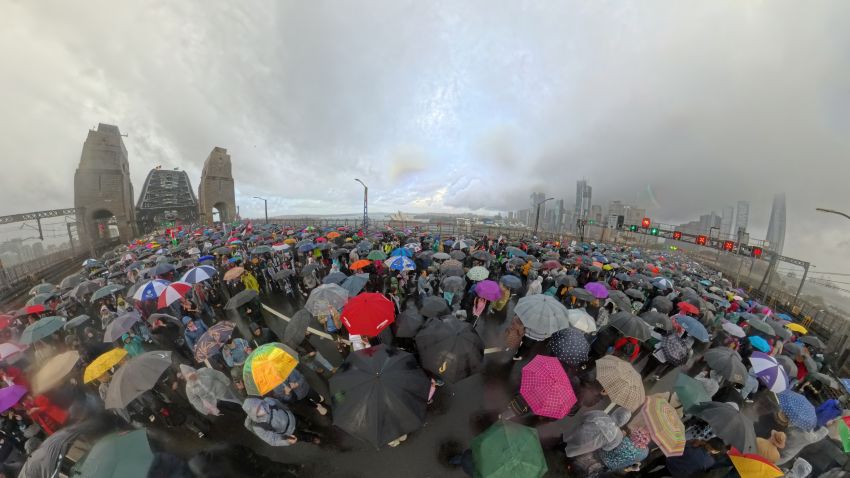
The historic Sydney Harbour Bridge protest for Palestine on Gadigal Country on August 3 proved what opinion polls had already shown: Most people want Australia to sanction Israel for its genocidal starvation policy. This has Labor, both state and federal, worried that it is losing the so-called “middle ground”.
Immediately after the march, federal Labor ministers were clearly reeling from the images of hundreds of thousands of people standing in the rain for hours in solidarity with Palestine; they know many were joining their first protest.
It has taken two years of sustained protests to bring up to 300,000 people out in the pouring rain.
Even seasoned protesters were reeling, but for different reasons — it was welcome proof that people agree with the movement’s demands and reject the government’s kowtowing to the Zionist lobby.
The mass of humanity on that iconic bridge has federal and state Labor MPs worried that their own base is angry with Labor’s shameful complicity in the genocide, particularly because Prime Minister Anthony Albanese used to champion justice for Palestine.
Labor is now looking for cover and its sudden rush to support a two-state “solution” may be it. Just what a Palestinian state covering an obliterated Gaza and a besieged West Bank would look like has not been answered by the government, even if the Zionists in charge of Israel’s genocidal policy were to accept it (which they won’t).
Foreign minister Penny Wong announced more aid, but it’s a drop in the ocean and how will it even reach those who need it? Health authorities tell us that starving Gazan children will never recover. About 100,000 Gazans have been killed already. The psychological toll from the slaughter on those still alive is immeasurable.
The “blame Hamas” line is wearing thin; Hamas is less a military threat to the Israel Defense Forces than a political one. While Israel continues its blitzkrieg, with United States help, support for Hamas will remain.
The Harbour Bridge protest also unleashed potentially powerful forces for Palestine: More than 12 unions — some Labor-affiliated — declared their support for the bridge march.
These include the Australian Services Union, Electrical Trades Union, NSW Nurses and Midwives Association, National Tertiary Education Union (NTEU), Communications Workers Union, Financial Sector Union, Independent Education Union, Australian Manufacturing Workers Union Retail and Fast Food Workers Union, Maritime Union of Australia, Media Entertainment and Arts Alliance, United Workers Union and NSW Teachers Federation.
It is very significant that more than 300 groups supported the protest, including churches, community groups, sport and surf clubs and civil rights organisations.
Now, however, comes the challenge of how best to seize on the new opportunities to grow the organised movement beyond its current size.
Already, some organisations are stepping up. The NTEU is calling on Unions NSW and the Australian Council of Trade Unions (ACTU) to support a national day of action for Gaza on September 10. The Free Palestine Melbourne group has called a public meeting in the Victorian Trades Hall on August 14 to discuss how the labour movement can stand with Palestine.
Palestine solidarity protest groups have decided to make August 24 a national day of action, focused on demanding sanctions, ending the arms trade and increasing aid.
Other initiatives are being discussed, including sit-ins at Labor MPs’ offices. Religious organisations placed an advertisement in the August 6 Age and Sydney Morning Herald.
This will add to the pressure on Labor to act.
Significant cracks in Labor are beginning to appear. The NSW Labor caucus is divided, we’re told. Some of Premier Chris Minns’ right faction colleagues have told him to pull his head in over mooted new laws to ban protests at iconic sites, such as the Sydney Harbour Bridge.
The Victorian Labor conference over August 2–3 passed pro-Palestine motions, as well as anti-AUKUS ones.
The ACTU is under pressure to issue a more up-to-date statement in support of Palestine and to mobilise unions for Gaza.
The ACTU’s May statement called on Labor to: End all military trade; force Israel to withdraw from all Palestinian lands, in line with international law; and support international efforts to prosecute violations of international law. It needs to add its voice to the demand to sanction Israel, expel the Israeli ambassador and commit to follow the International Court of Justice’s advisory opinion.
The March for Humanity also dealt a blow to the Zionist lobby's demand that the government adopt its talking points — including the lie that any criticism of Israel is antisemitic.
Kenneth Roth, a former leader of Human Rights Watch, interviewed on the ABC’s 7.30, did not hold back from criticising Jillian Segal, the Special Envoy to Combat Antisemitism, saying her recommendations would increase antisemitism, not end it.
He said universities should not be forced to adopt the International Holocaust Remembrance Alliance definition of antisemitism, and suggested others, such as the Jerusalem Declaration on Antisemitism, could be considered.
The Palestine movement has been building for two years, largely without institutional support.
Now, there’s a greater willingness of major progressive institutions (unions and others) to support the movement, and this needs to be an immediate focus.
The March for Humanity truly was a historic act. Everyone there, and the millions who watched on in sympathy, say it has given them hope that this genocide will end, and soon.
We need to back that in, for the people of Gaza and the West Bank.
[Pip Hinman is a member of Socialist Alliance and an anti-war activist.]